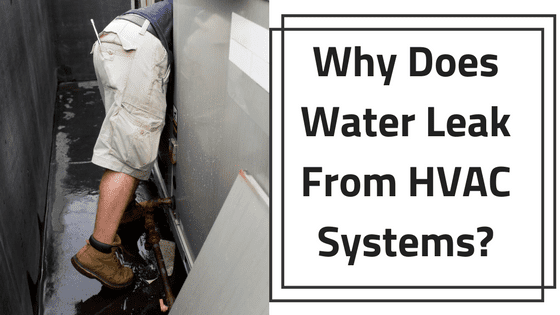Water leaking from rooftop HVAC systems isn’t just annoying; it can become a distressing problem, especially when it involves closing down a commercial, government or industrial facility to fix water damage.
While it’s common for water resulting from the condensation and dehumidification process to be around the drain line, particularly on hot or humid days, water leaking from a HVAC system is a different thing. As several different factors can cause this, let’s analyze them one by one. The top 4 reasons that water leaks from HVAC systems are:
- Clogged Condensate Drain Line
- Poorly Insulated Ductwork
- Frozen Evaporator Coil
- Faulty Condensate Pump
Clogged Condensate Drain Line
The most frequent cause of water leaks in HVAC units is when the drain pipe becomes clogged with dirt, dust, rust and other debris, causing the drain pan to overflow. As the condensed moisture can no longer drain out through the drain pipe, it accumulates within the duct system and around the vent, and water will start dripping out. A cracked drain pan can also cause water leakage.
Poorly Insulated Ductwork
When the ductwork isn’t properly insulated, the cool air comes into contact with warmer ducts throughout its journey. As a result, excess condensation will form inside the unit, leading to leaks in various parts of the HVAC system and from the vent.
Due to temperature differences between the air inside and the air outside the ducts, condensation can also accumulate on the exterior surface of the ducts and drip in the ceiling. This will create a favorable environment for mold, mildew, dry rot and other microorganisms.
Frozen Evaporator Coil
Low levels of refrigerant and dirty air filters are two of the most common factors that can cause the evaporator coil to freeze up.
In an under-charged HVAC unit, the temperature around the coils can drop below the freezing point. As the warm air from temperature-controlled spaces moves through the system, the condensation that forms on the evaporator coil will freeze and ice will begin to form. Once the HVAC unit shuts off, the ice starts to melt and the resulting water will either drip out of the vents in the ceiling or overflow the drain pan.
The same problem can occur if the air filter gets clogged. As a dirty air filter blocks the airflow, it can prevent proper ventilation and cause the coil to freeze.
Over-sizing an HVAC system is another mistake that can result in freeze-ups and water leaking from the unit. That’s because an oversized HVAC unit becomes susceptible to short cycling, inadequate dehumidification and significant temperature variations.
Broken fans, blocked condensate lines, malfunctioning thermostats and low pressure inside the system are a few more causes of frozen evaporator coils. If a HVAC system is allowed to operate in this condition for too long, the compressor can get damaged.
Faulty Condensate Pump
Some HVAC systems include a condensate drain pump, which removes the water resulting from the dehumidification and condensation processes from the building. If the pump breaks down, it can no longer pump the water outside, which means the water will collect inside the system and eventually overflow.
When it comes to water leaking from HVAC units, one way to avoid costly damage and expensive service calls is to have your system inspected and maintained by a professional on a regular basis.
Opting for the right routine maintenance plan can help improve comfort levels and air quality, while prolonging the service life of all the components, including of the compressor which is one of the most expensive elements in HVAC systems.
To find out how our remanufactured air-cooled reciprocating, scroll and screw compressors can add years of life to your HVAC unit, please contact our friendly and experienced professionals today at 972-286-2264!












